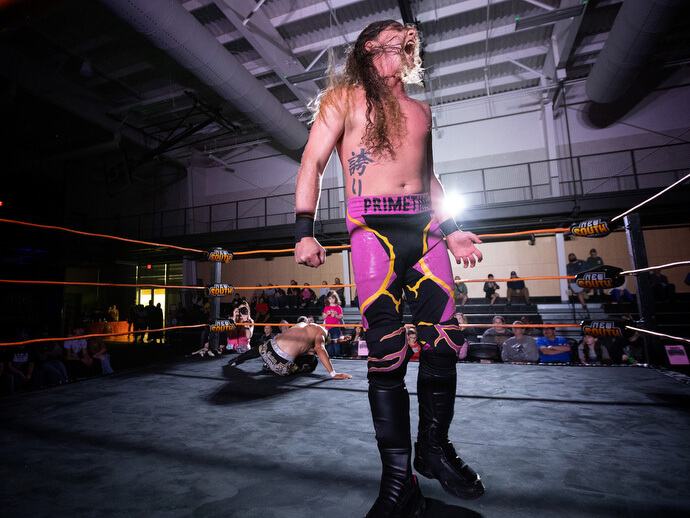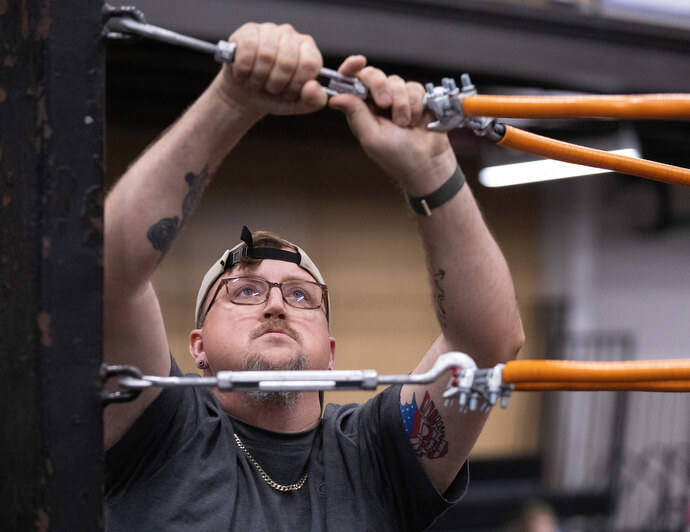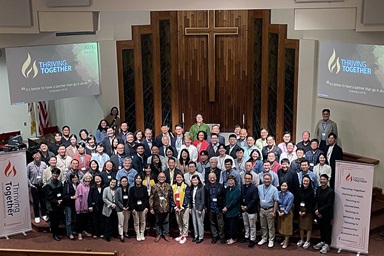Key Points:
- The life of a performer in small-time wrestling can be a world of loneliness, addiction and injuries.
- The Rev. Steven Barber, a United Methodist pastor in Alabama, shows up at wrestling events bearing bottled waters and a willingness to listen.
- He’s been accepted as an unofficial chaplain at five wrestling promotions, and he’d like to expand.
It didn’t look good for Rolando Perez, a strutting rooster of a man with a small frame, big hair and a bad attitude.
He briefly performed in one of the first New South Pro Wrestling matches Nov. 2 at the Priceville Event Center, about two hours south of Nashville, Tennessee. His opponent was Jamesen Shook, a much larger man rumored to be on the cusp of bigger things in professional wrestling.
Perez and Shook held their stiffened arms upward and linked hands in a test of strength. Suddenly there was quick movement and Perez winced. We later found out that he had dislocated his shoulder for the second time in a few months.
The referee held up both of his own arms, crossing them to make an “X.”
“We saw the ref throw up ‘Xs,’ which is the universal wrestling sign for, ‘Hey, we have to stop the match. We have an injured wrestler,’” said the Rev. Steven Barber, a United Methodist pastor who volunteers as a chaplain for professional wrestlers.
“I looked over at Rolando’s girlfriend and I could see the horror come over her face,” he added.
“I knew that it was a very real injury that had taken place, and so once they got him out of the ring, I immediately went back in order to check on him, to check on her, but also to check on Jamesen Shook,” Barber said.
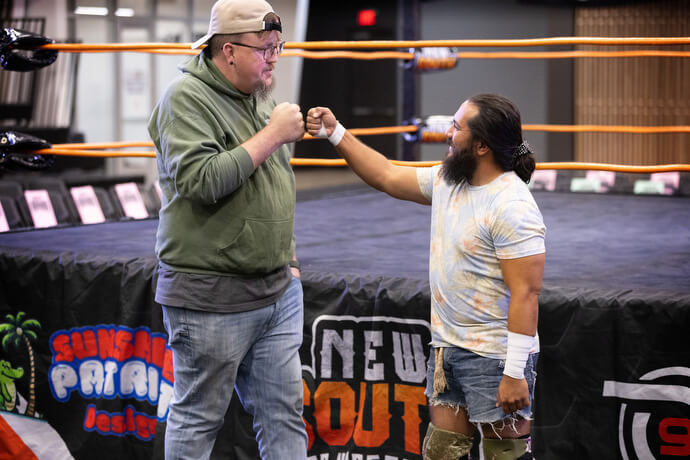
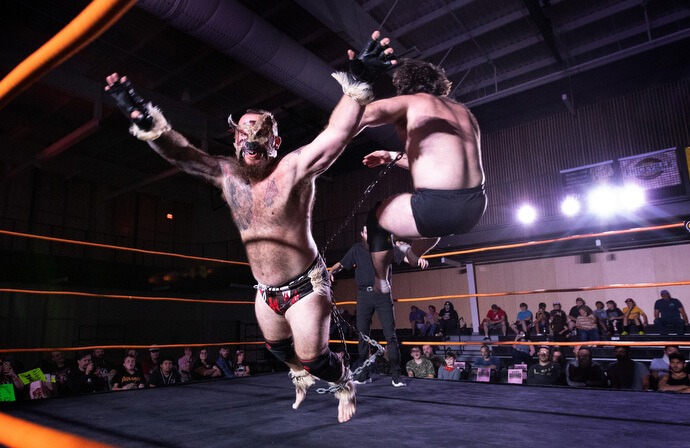
Any time a wrestler gets injured, he said, “the wrestler that you’re in the ring with, whether it’s their fault or not, often takes some of the blame, and worry that they could have done something different to keep you safe.”
Barber followed up with text messages and phone calls the following week. He has a friendly, shaggy-dog demeanor that tends to endear him quickly to people. He has the size to be a wrestler, but probably not the killer instinct.
“He’s just been a good guy,” said Perez, who is low-key when not inhabiting his villainous and very funny character that he says is an amalgamation of the drug dealers on the “Breaking Bad” television show, Al Pacino’s “Scarface” and a bit of Elvis Presley — mostly because of his big hair.
“That’s my natural hair, brother, I swear,” he said, betraying that the cockiness of his wrestling alter ego might have a bit of truth to it.
“(Barber has) never tried to persuade me into following a certain religion or anything like that. I think he takes the good parts of religion and God, and he’s … an excellent example of a good man,” Perez said.
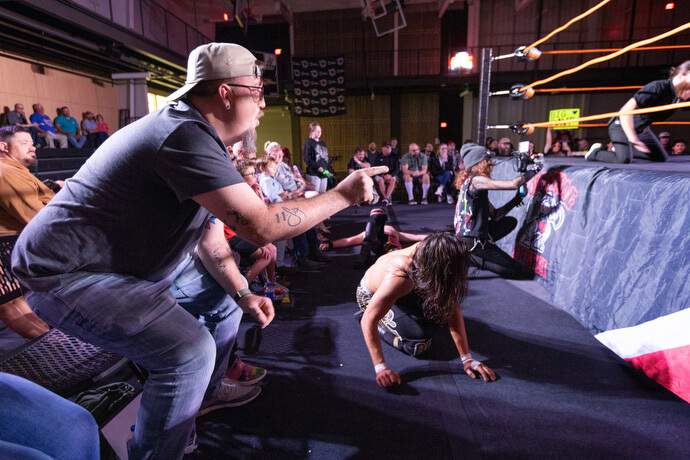
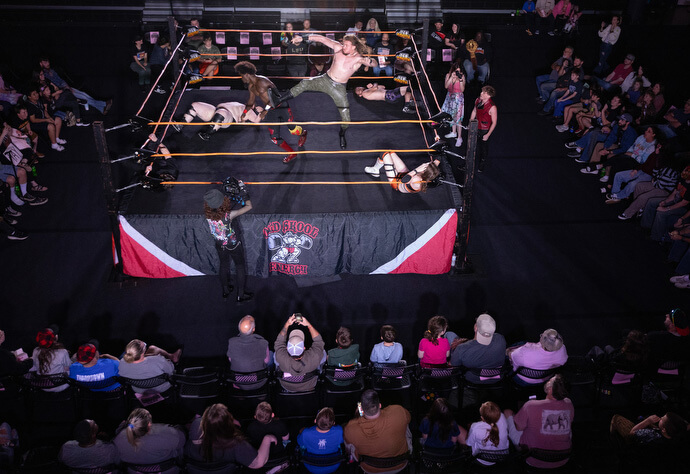
Barber, a local licensed pastor at Neel United Methodist Church in Hartselle, relates well to wrestlers because like them, he took an interest in pro wrestling as a child that’s never wavered. Also like Barber, most of the wrestlers have day jobs because a small wrestling promotion like New South isn’t lucrative.
Among the wrestlers and others at the Nov. 2 show was a middle school janitor, construction engineer, metal fabrication shop worker, grocery deliverer and activities director at a mental hospital.
Wrestling can be a lonely life, spending long stretches away from family and being tempted to pass the time in non-constructive ways while cooped up in a small-town motel room without much to do. Drugs and alcohol are at the front of the line of the temptations.
How to help
But show business at any level attracts the creative streak in artists and audiences. There’s no lack of people wanting this low-paying, injury-prone life. Telling good-versus-evil stories through grown men and women dangerously hurling themselves at each other in a boxing ring is something that sparks passion in the wrestlers.
The same goes for the people doing the grunt work of setting up and tearing down rings and selling merchandise, and the fans as well. New South Pro Wrestling strives to be family friendly, and the price is right at $10 for a bleacher seat and $25 for the first row.
Barber has ingratiated himself by bringing water and energy drinks for the wrestlers when he attends. He also has a hint of colorful wrestler in himself, driving an orange Jeep with a cross suspended between Mardi Gras beads draped around his rearview mirror.
Barber helps set up and tear down the wrestling ring in each town. He doesn’t charge the wrestlers or the promotions for his work.
“It’s the power of presence,” he said. “Bringing in waters is a huge thing, and an easy way to make it into the locker room and show that you’re serious.”
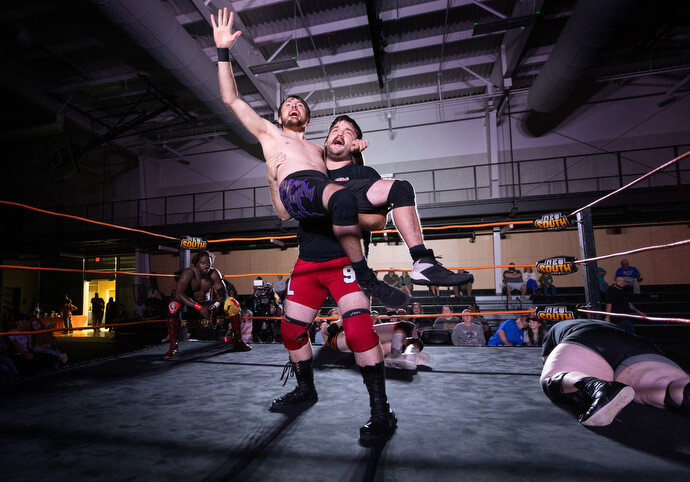
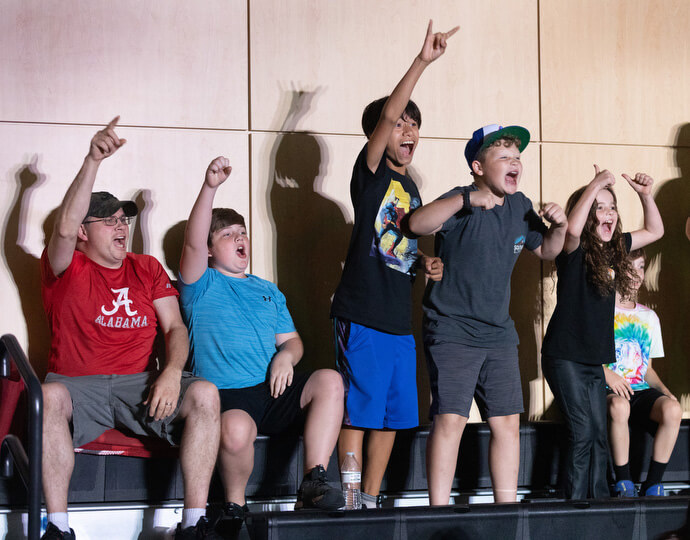
He’s been advised that the hard labor part isn’t necessary for access to do his chaplain work, but chooses to do it anyway. He works with New South Pro Wrestling, New Level Pro Wrestling, Southern Wrestling Alliance, Retinal Pro Wrestling and Spartan Wrestling. There are others that he checks on but can’t attend often because of geography and his other duties.
“I want them to know that I care about you even when the work gets hard,” Barber said. “So those are the simple things, like sweating alongside of them and being open and willing to let people come to trust you, giving them the time and the space they need, maybe checking in on them without even really expecting a response.”
Subscribe to our
e-newsletter
After President Trump was elected Nov. 5, Barber checked in with his contacts in the transgender community, who are a presence in the ring and as spectators at New South Pro Wrestling events.
“I sent out a bunch of messages this morning, and just said, ‘Hey, I’m glad you’re here, you are loved and the world’s better with you,” he said. “I had some people respond, and some people didn’t, and that’s OK because it’s the consistency in my presence, in my advocating on their behalf, that lets them know I’m a safe person that they can trust and come and talk to.”
Barber was first exposed to professional wrestling as a child.
“I was raised in a single-mother household with two brothers, and my mom worked very hard to make sure we had everything we ever needed,” he said.
While his mother was working or taking nursing classes, Barber spent a lot of time with his great-grandparents, who he said loved professional wrestling.
“My great-grandfather would get Godfather’s pizza and wings, my great-grandmother made an apple pie and we would just sit there and watch wrestling,” he said.
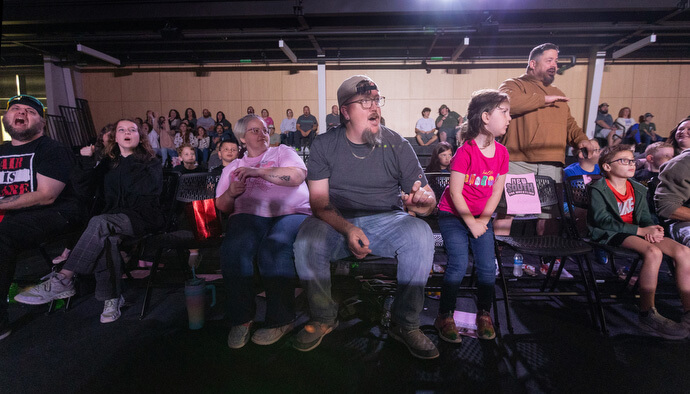
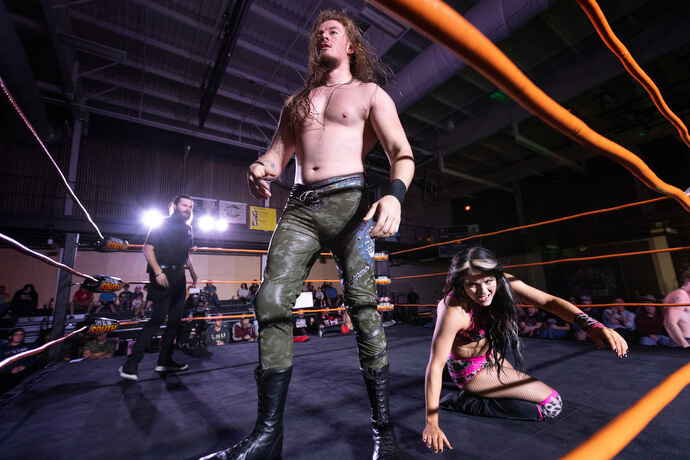
Barber’s wife, the Rev. Megan Barber, also watched wrestling growing up. Their daughter, Gwenivere, 7, sometimes tags along with her dad to matches.
Barber didn’t get interested in Christianity until he was 17. He attended a charismatic church for a while, and later helped plant New Vision United Methodist Church in Florence. He earned a master’s degree at Asbury Theological Seminary, and deliberately chose to be a local licensed pastor.
“I don’t think it’s for everybody, but I think it’s for me,” Barber said. “I’ve committed my life to work with people in rural communities in order to create thriving faith communities for them to serve.
“It means less about church growth and budgets and more about connecting with the community at large.”
Ministering to people in professional wrestling fits that profile. Barber would like it to be his sole focus one day.
“If you play a heel, which is a bad guy, your job is to get the whole arena to not like you, right? So you’ll have people yelling and cussing you and … telling you that you suck, and that’s you doing your job,” he said.
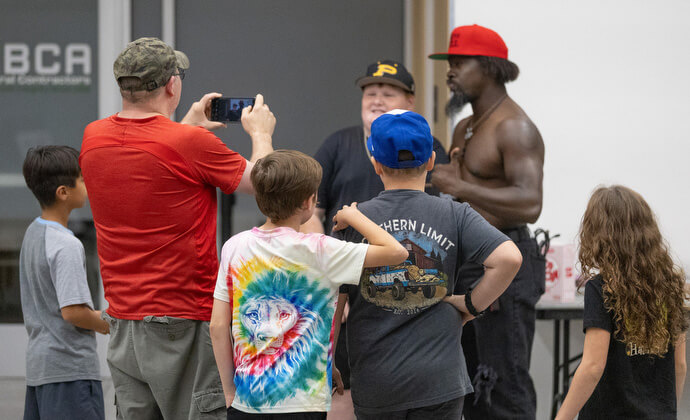
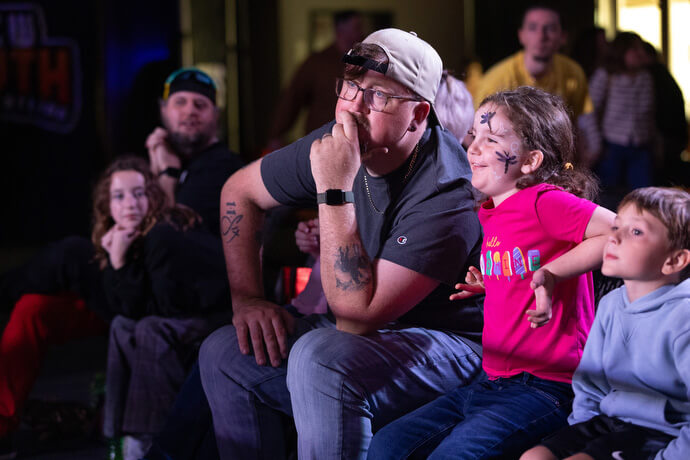
But if a wrestling heel also gets mostly negative feedback at home, it can cause issues.
“A big part of what we do is suicide prevention,” said Barber, who himself deals with depression and has in the past had thoughts of suicide. “Our whole thing is that when life is at its darkest and you feel there’s nobody in your corner, you can reach out and you can have us in your corner.”
He said the goal is for none of the wrestlers to turn toward addiction or suicide to handle problems.
That concern goes for everybody at a wrestling match, including concessions and merchandise vendors and workers who help set up and tear down the ring.
Reese Lyn Thomas, who runs the merchandise table and is the girlfriend of Perez, the wrestler who was injured in Priceville, said she’s “not a wrestler, and I’m not religious,” but describes Barber as a good friend with whom she’s had a lot of good conversations. She considers him a “phenomenal asset” to have in the locker room.
“A lot of these people just need someone neutral that they can speak to about the things that a lot of people don’t want to talk about,” she said. “Steven is that sounding board, and he is such a fantastic advice-giver friend. He is that for a lot of us, including me.”
Patterson is a UM News reporter in Nashville, Tennessee. Contact him at 615-742-5470 or [email protected]. To read more United Methodist news, subscribe to the free Daily or Weekly Digests.
